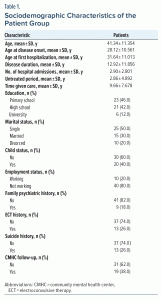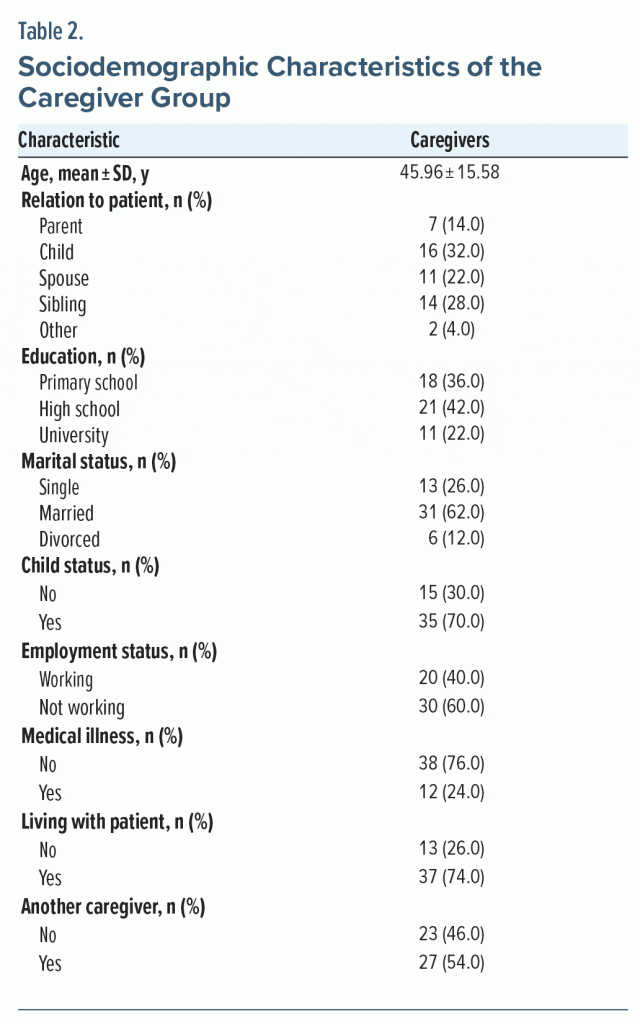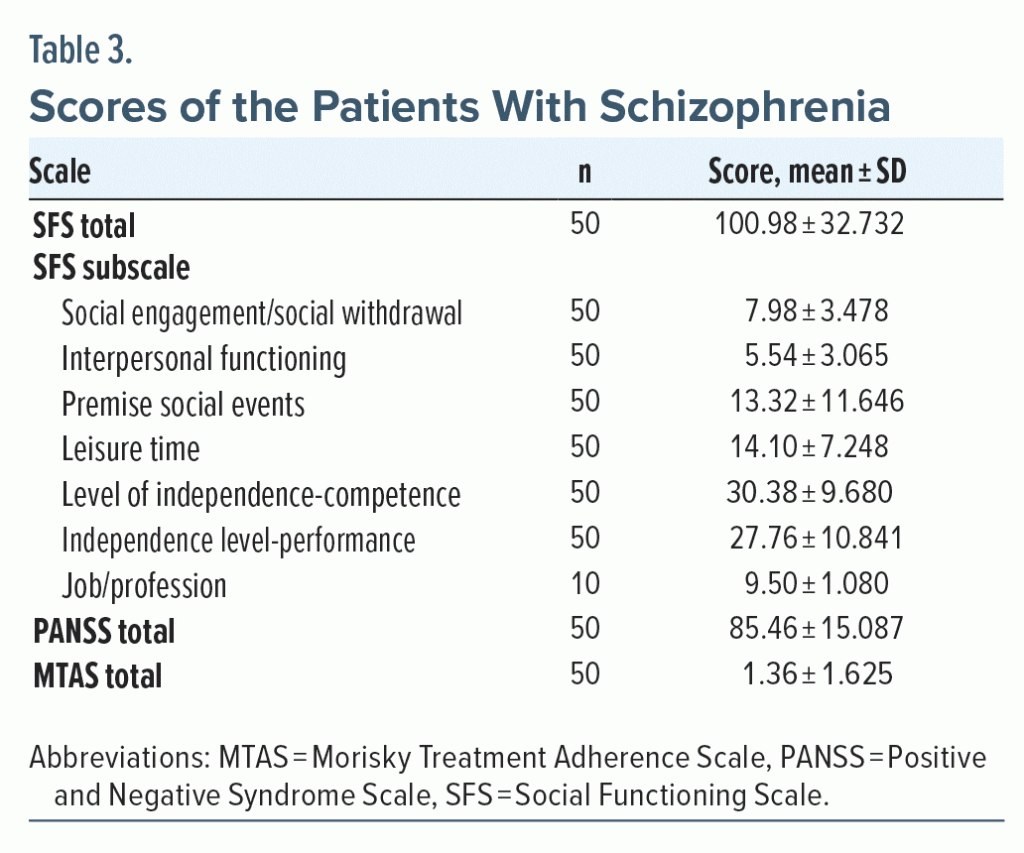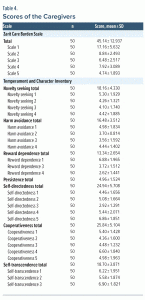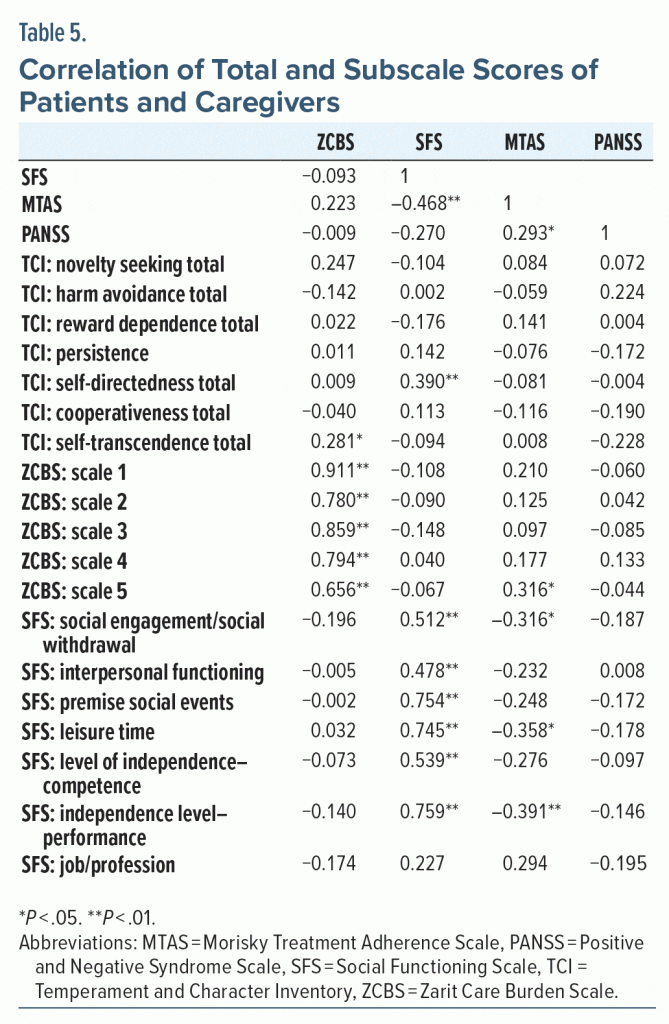ABSTRACT
Objective: To evaluate the effects of care burden and personality traits of caregivers on treatment compliance and social functionality of patients with schizophrenia.
Methods: This cross-sectional study included 50 patients aged 18–65 years diagnosed with schizophrenia (DSM-5 criteria) who were followed up in the hospital between December 2020 and June 2021. Fifty caregivers (ie, spouses, parents, siblings, and children) were also included in the study. All study participants completed a sociodemographic data form. Caregivers completed the Temperament and Character Inventory (TCI) and the Zarit Care Burden Scale (ZCBS). Patients completed the Social Functioning Scale (SFS), the Morisky Treatment Adherence Scale (MTAS), and the Positive and Negative Syndrome Scale (PANSS).
Results: There was a positive correlation between MTAS and PANSS scores (r = 0.293, P < .05) of patients with schizophrenia and a negative correlation between MTAS and SFS total scores (r = −0.468, P < .01). There was a positive correlation between MTAS and ZCBS-dependency subgroup scores (P < .05). A positive correlation was found between caregivers’ TCI subdimensions, especially self-directedness total score and SFS total score (P < .01), as well as between self-transcendence total score and total ZCBS score (P < .05).
Conclusions: Based on the study results, temperament and character characteristics of caregivers affect both the care burden of caregivers and the social functionality of patients; however, larger samples are required to measure the effects of caregivers’ personality traits and care burden on patients’ functioning and adherence to treatment.
Prim Care Companion CNS Disord 2023;25(6):23m03522
Author affiliations are listed at the end of this article.
Schizophrenia is a long-term mental illness that fluctuates between remission and relapse, impairing functionality in areas such as self-care, employment, and interpersonal relationships.1,2 A high level of caregiver burden was noted in 49% of caregivers of patients with schizophrenia.2 After hospital discharge, 65%–75% of schizophrenia patients return home and are cared for by their relatives.3 It has even been stated that patients with schizophrenia need 24-hour home care.4 Patients are highly dependent on their caregivers for their daily life activities,5 which leads to restructuring of home schedules, disruption of family routines,6 and increased caregiver burden.
Problems with treatment compliance are frequently cited as the main factor causing severe deterioration in patients with mental disorders. Approximately 60% of schizophrenia patients do not follow their treatment regimens, resulting in issues that impact the illness course, including drug resistance, relapse, remission, and increased hospitalizations.7,8 It has been shown that treatment compliance increases functionality in these patients and reduces the burden on caregivers.9
Caregiver burden is influenced by the clinical profile of the patient, the personality of the caregivers, and the various forms of social support provided to the family.10 For example, the burden of care increases as the caregiver’s coping strategies decrease.11 It has been observed that as treatment compliance increases, the social performance of the patient increases and the caregiver burden decreases.9,12 On the other hand, in schizophrenia patients who choose to be more isolated from society, social functionality is impaired in most areas, and caregiver burden increases as the level of social functionality deteriorates.
Another factor affecting caregiver burden is the caregiver’s personality traits. The psychobiological model of temperament and character suggests that personality traits are inherited and regulated by brain systems that influence susceptibility to schizophrenia.13 When the temperament and character of relatives of schizophrenia patients were evaluated, it was determined that the tendencies of novelty seeking and self-transcendence were low.14 In another study,15 self-transcendence scores were significantly higher in relatives of schizophrenia patients with schizotypal characteristics. Relatives of patients with schizophrenia without schizotypal features had higher self-directedness and cooperativeness scores than the control group.15 Previous research examined the personality traits of schizophrenia patients and their relatives. However, research on how caregivers’ temperament and character traits affect caregiver burden of treatment compliance and functionality is scarce. Therefore, we aimed to evaluate the effects of care burden and personality traits of caregivers of patients with schizophrenia on the patients’ treatment compliance and social functionality.
METHODS
Design
This cross-sectional study included 50 patients aged between 18 and 65 years, all primary school graduates, with a diagnosis of schizophrenia (DSM-5 criteria) who were followed up in a psychiatric hospital between December 2020 and June 2021. Fifty caregivers were also included. All participants provided written informed consent to participate after receiving oral and written information about the study. Caregivers were spouses, parents, siblings, and children involved in the patients’ care with no financial gain in return. Individuals with mental retardation, neurocognitive disorder, history of brain injury or trauma, and alcohol/substance abuse were excluded from the study. Approval for the study was obtained from the hospital ethics committee. The study was conducted in accordance with the ethical standards specified in the 1964 Declaration of Helsinki.
Data Collection
All study participants completed a sociodemographic data form. Caregivers completed the Temperament and Character Inventory (TCI) and the Zarit Care Burden Scale (ZCBS). Patients completed the Social Functioning Scale (SFS), the Morisky Treatment Adherence Scale (MTAS), and the Positive and Negative Syndrome Scale (PANSS).
The sociodemographic data form included variables such as sex, education, marital status, employment status, clinical follow-ups, disease duration, time without treatment, and age at onset. The form was prepared by the researchers.
The TCI was created by Cloninger and colleagues in 1986 and is based on Cloninger’s psychobiological model.16 This model includes 4 temperament dimensions (novelty seeking, harm avoidance, reward dependence, and persistence) and 3 character dimensions (self-directedness, cooperativeness, and self-transcendence). The Turkish validity and reliability of the 240-item scale were performed by Köse et al.17
The ZCBS was developed by Zarit et al.18 It is a 14-item, 5-point Likert-type scale, and item scores range from 0 to 5 (0: never, 1: rarely, 2: sometimes, 3: often, and 4: almost always). The Cronbach α reliability coefficient of the ZCBS is 0.83. Evaluation of the ZCBS is made over the total score, which ranges between 0 and 56, and a high score indicates a high level of distress. The Turkish validity and reliability study was conducted by Özer et al.19
The SFS was developed by Birchwood et al20 and consists of 7 parts: social withdrawal, interpersonal functioning, primary social activities, leisure time, independence-competence, independence-performance, and work/occupation. Turkish validity and reliability studies were performed by Erakay.21
The MTAS was developed and validated by Morisky et al.22 The scale evaluates drug compliance and consists of 4 “yes/no” questions completed by the patient. If all questions are answered “no,” drug compliance is considered high, if 1 or 2 questions are answered “yes,” drug compliance is considered medium, and if 3 or 4 questions are answered “yes,” drug compliance is considered low. The validity and reliability study in Turkey was conducted by Bahar et al,23 and the Cronbach α reliability coefficient was 0.625.
The PANSS developed by Kay et al24 is a semistructured interview scale consisting of 30 items and a 7-point severity assessment. Of these 30 items, 18 were adapted from the Brief Psychiatry Rating Scale and 12 from the Psychopathology Rating Scale.24 Seven of the items evaluated belong to the positive syndrome subscale, 7 to the negative syndrome subscale, and the remaining 16 to the general psychopathology subscale.24 The Turkish reliability and validity study of the scale was performed by Kostakoğlu et al.25
Statistical Analyses
Statistical analysis was performed using SPSS version 26. Descriptive statistics are reported as mean, standard deviation, frequency, and percentage. The conformity of the data to the normal distribution was examined with the Shapiro-Wilk test, and the data conformed to the normal distribution. The χ2 and Fisher exact tests were used to compare categorical variables in different groups. Independent sample t test and Pearson correlation analysis were applied for variables with normal distribution. The correlation of numerical variables with each other was evaluated using Pearson correlation analysis. For statistical significance, the total type 1 error level was 5%. P < .05 was accepted as statistically significant in all tests.
RESULTS
Sociodemographic Characteristics of the Patients and Caregivers
The mean ± SD age of the patient group was 41.34 ± 11.35 years, and the average age of caregivers was 45.96 ± 15.58 years. The sociodemographic characteristics of the patient and caregiver groups are provided in Table 1 and Table 2.
Mean Scores of the Patient and Caregiver Groups
Total scores for the schizophrenia patients were as follows: SFS: 100.98 ± 32.732, PANSS: 85.46 ± 15.087, and MTAS: 1.36 ± 1.625 (Table 3).
For caregivers, the ZCBS total score was 45.14 ± 12.937. Total TCI subscores were novelty seeking: 18.16 ± 4.330, harm avoidance: 16.48 ± 3.512, reward dependence: 13.34 ± 2.654, persistence: 4.96 ± 1.524, self-directedness: 24.94 ± 5.708, cooperativeness: 25.84 ± 5.104, and self-transcendence: 18.70 ± 3.871 (Table 4).
Correlation of Total and Subscale Scores for Patients and Caregivers
In the evaluation of the MTAS scale, positive correlations were found with the PANSS scale (r = 0.293, P < .05) and the ZCBS dependency subscale (r = 0.316, P < .05), while negative correlations were found with the SFS total score (r = −0.468, P < .01) and social occupation/withdrawal (r = −0.316, P < .05), leisure time (r = −0.358, P < .05), and independence level with performance (r = −0.391, P < .01) subscale scores.
There was a positive correlation between the self-directedness character subdimension total score and the SFS total score (r = 0.390, P < .01) and between the self-transcendence character subdimension total score and the ZCBS total score (r = 0.281, P < .05). When the scale validity findings were examined, very high correlations were found between the scales’ own subscales, and it can be stated that the tests are highly significant and valid (Table 5).
DISCUSSION
Schizophrenia is a serious mental illness that has important consequences for both patients and their caregivers. Due to the chronicity of the disease, relatives of schizophrenia patients bear the main burden of the disease. Various aspects such as caregiver burden, coping attitudes, quality of life, social support levels, emotions, and psychological illness have been evaluated in previous research.26 In our study, we found that as the severity of symptoms of the disease decreased, social functionality increased, and the caregiver burden was affected by increasing adherence to treatment. When personality traits of caregivers were evaluated, we found that patients’ self-transcendence character subdimension and caregiver burden were positively related, while self-directedness character subdimension was positively related to social functionality.
In a study27 examining the relationship between the personality traits of caregivers and burden of care using the egocentric personality inventory, it was observed that the burden levels were higher in caregivers with a high tendency to psychoticism. Also, the caregivers’ quality of life was negatively affected as the level of caregiver burden increased.27 In another study,15 first-degree relatives of patients with schizophrenia showed lower novelty-seeking and self-transcendence tendencies than controls. It was noted that lower novelty-seeking and lower self-transcendence provide a protective effect in relatives.15 In another study,28 first-degree relatives of schizophrenia patients had lower novelty-seeking scores and higher self-transcendence scores compared to the control group. People with low self-transcendence scores tend to be practical, neutral, materialistic, controlling, and ostentatious.29 In our study, it was observed that the burden of care increased as the personality inventory, character subdimension, and self-transcendence scores increased.
The dimensions of the TCI have been shown to be the most important predictors of harm avoidance, self-direction, and self-transcendence quality of life.28 The majority of caregivers in our study were close relatives, and it was determined that as the self-transcendence scores increased, the burden of care increased, and the functionality of the patients improved as the self-management score increased. Self-management character subdimension measures the differences in executive functions of the individual. A highly self-directed person is self-confident, responsible, reliable, resourceful, purposeful, and at peace with himself/herself. The biggest advantage of self-directed individuals is that they are realistic and effective.29 In other words, based on the results of our study, as these characteristics of the caregivers increase, they have a positive effect on the social functionality of the patients.
Caregivers believe that they are responsible for the patient’s adherence to treatment. They report that the diagnosis of schizophrenia strains their emotional health, reduces their ability to have a satisfying personal life, and disrupts their family life.30 According to our study results, as the caregivers’ burden of care-dependence score increased, treatment compliance deteriorated, and social functionality was negatively affected as treatment adherence deteriorated. In addition, as PANSS scores increased, social functionality deteriorated. Previous research revealed that psychosocial skills training increases patients’ quality of life and treatment compliance, reduces the rate of repeated hospitalizations, improves their familial and social relations, and places them in a better position to fulfill their roles and responsibilities.31 It has been observed that when relatives/caregivers engage in psychoeducation, difficulties of caring for the patient are reduced, and they gain a better understanding of the disease, are able to deal with the symptoms of the disease effectively, and develop more effective coping methods.31 Based on the findings of our study, psychoeducation for patients with schizophrenia and their caregivers can be effective in helping them cope with the disease.
Limitations of this study include the small sample size, the heterogeneous group of caregivers, the single-center design, and that the caregivers were related to the patients, which can affect the variables.
CONCLUSION
According to our study results, in addition to the symptoms of schizophrenia, factors such as caregiver personality traits and caregiver burden are important in terms of adherence to treatment and functionality in patients with schizophrenia and should be considered in treatment and follow-up. However, more specific and larger-sample studies are needed to better understand the effects of schizophrenia caregivers’ personality traits and care burden on treatment compliance and functionality of patients with schizophrenia.
Article Information
Published Online: November 16, 2023. https://doi.org/10.4088/PCC.23m03522
© 2023 Physicians Postgraduate Press, Inc.
Submitted: March 8, 2023; accepted June 21, 2023.
To Cite: İzci F, Bascavus M, Aslan M, et al. Effect of care burden and personality traits of caregivers on treatment compliance and functionality of patients with schizophrenia. Prim Care Companion CNS Disord. 2023;25(6):23m03522.
Author Affiliations: Department of Psychiatry,
Faculty of Medicine, Sağlık Bilimleri University, Istanbul, Turkey (all authors); Erenköy Mental Health and Diseases Training and Research Hospital, Erenköy, Istanbul, Turkey (all authors).
Corresponding Author: Filiz İzci, MD, Sinan Ercan Cad. No:23 Kazasker, Erenköy, Kadıköy 34736 Istanbul, Turkey ([email protected]).
Relevant Financial Relationships: None.
Funding/Support: None.
ORCID: Filiz İzci: https://orcid.org/0000-0003-0576-9487; Metin Aslan: https://orcid.org/0000-0001-9052-4622
Clinical Points
- The temperament and character traits of caregivers may affect the social functionality of patients with schizophrenia.
- Personality traits of caregivers of schizophrenia patients may affect their care burden.
- Burden of care on caregivers may affect treatment compliance of patients with schizophrenia.
References (31)

- Adeosun II. Correlates of caregiver burden among family members of patients with schizophrenia in Lagos, Nigeria. Schizophr Res Treatment. 2013;2013(2):353809. PubMed CrossRef
- Inogbo CF, Olotu SO, James BO, et al. Burden of care amongst caregivers who are first degree relatives of patients with schizophrenia. Pan Afr Med J. 2017;28:284. PubMed CrossRef
- von Kardorff E, Soltaninejad A, Kamali M, et al. Family caregiver burden in mental illnesses: The case of affective disorders and schizophrenia - a qualitative exploratory study. Nord J Psychiatry. 2016;70(4):248–254. PubMed CrossRef
- Caqueo-Urízar A, Gutiérrez-Maldonado J, Miranda-Castillo C. Quality of life in caregivers of patients with schizophrenia: a literature review. Health Qual Life Outcomes. 2009;7(1):84. PubMed CrossRef
- Igberase OO, Morakinyo O, Lawani AO, et al. Burden of care among relatives of patients with schizophrenia in midwestern Nigeria. Int J Soc Psychiatry. 2012;58(2):131–137. PubMed CrossRef
- Pickett SA, Cook JA, Cohler BJ, et al. Positive parent/adult child relationships: impact of severe mental illness and caregiving burden. Am J Orthopsychiatry. 1997;67(2):220–230. PubMed CrossRef
- Lingam R, Scott J. Treatment non-adherence in affective disorders. Acta Psychiatr Scand. 2002;105(3):164–172. PubMed CrossRef
- Prasko J, Vrbova K, Latalova K, et al. Psychoeducation for psychotic patients. Biomed Pap Med Fac Univ Palacky Olomouc Czech Repub. 2011;155(4):385–395. PubMed CrossRef
- Gandhi S, Pavalur R, Thanapal S, et al. Medication adherence, work performance and self-esteem among psychiatric patients attending psychosocial rehabilitation services at Bangalore, India. Indian J Psychol Med. 2014;36(4):392–396. PubMed CrossRef
- Grandón P, Jenaro C, Lemos S. Primary caregivers of schizophrenia outpatients: burden and predictor variables. Psychiatry Res. 2008;158(3):335–343. PubMed CrossRef
- Lim YM, Ahn YH. Burden of family caregivers with schizophrenic patients in Korea. Appl Nurs Res. 2003;16(2):110–117. PubMed CrossRef
- Bhawana K, Chellappan XB, Rohilla J. Efficacy of family psychoeducation on drug compliance, self-esteem and caregivers’ burden among selected psychiatric inpatients from a tertiary care centre, North India. Ind Psychiatry J. 2022;31(1):89–97. PubMed CrossRef
- Smith MJ, Cloninger CR, Harms MP, et al. Temperament and character as schizophrenia-related endophenotypes in non-psychotic siblings. Schizophr Res. 2008;104(1-3):198–205. PubMed CrossRef
- Gonzalez-Torres MA, Inchausti L, Ibáñez B, et al. Temperament and character dimensions in patients with schizophrenia, relatives, and controls. J Nerv Ment Dis. 2009;197(7):514–519. PubMed CrossRef
- Bora E, Veznedaroglu B. Temperament and character dimensions of the relatives of schizophrenia patients and controls: the relationship between schizotypal features and personality. Eur Psychiatry. 2007;22(1):27–31. PubMed CrossRef
- Cloninger CR, Svrakic DM, Przybeck TR. A psychobiological model of temperament and character. Arch Gen Psychiatry. 1993;50(12):975–990. PubMed CrossRef
- Köse S, Sayar K, Ak İ, et al. Mizaç ve Karakter Envanteri (Türkçe TCI): Geçerlik, güvenirliği ve faktör yapısı. Klinik Psikofarmakol BBülteni. 2004;14:107–131.
- Zarit SH, Orr NK, Zarit JM. Families Under Stress: Caring For The Patient with Alzheimer’s Disease and Related Disorders. New York University Press; 1985.
- Özer N, Yurttaş A, Hacıalioglu N. National Surgery Congress 2006. Antalya, Turkey; December 4–6, 2019:1.
- Birchwood M, Smith J, Cochrane R, et al. The Social Functioning Scale. The development and validation of a new scale of social adjustment for use in family intervention programmes with schizophrenic patients. Br J Psychiatry. 1990;157(6):853–859. PubMed CrossRef
- Erakay SY. Şizofreni tanılı hastalarda sosyal işlevsellik ölçeği (SİÖ) Türkçe formunun geçerlilik ve güvenilirliğinin araştırılması. Yayımlanmamış tez çalışması. 2001.
- Morisky DE, Green LW, Levine DM. Concurrent and predictive validity of a self-reported measure of medication adherence. Med Care. 1986;24(1):67–74. PubMed CrossRef
- Bahar G, Savaş HA, Unal A, et al. Reliability and validity of the Morisky Medication Adherence Scale for bipolar mood disorder. Anadolu Psikiyatri Derg. 2014;15(2):141–149. CrossRef
- Kay SR, Fiszbein A, Opler LA. The Positive and Negative Syndrome Scale (PANSS) for schizophrenia. Schizophr Bull. 1987;13(2):261–276. PubMed CrossRef
- Kostakoğlu AE, Batur S, Tiryaki A, et al. Pozitif ve Negatif Sendrom Ölçeğinin (PANSS) Türkçe uyarlamasının geçerlilik ve güvenilirliği. Turk Psikol Derg. 1999;14:23–32.
- Kulhara P, Kate N, Grover S, et al. Positive aspects of caregiving in schizophrenia: A review. World J Psychiatry. 2012;2(3):43–48. PubMed CrossRef
- Geriani D, Savithry KS, Shivakumar S, et al. Burden of care on caregivers of schizophrenia patients: a correlation to personality and coping. J Clin Diagn Res. 2015;9(3):VC01–VC04. PubMed CrossRef
- Margetić BA, Jakovljević M, Ivanec D, et al. Temperament, character, and quality of life in patients with schizophrenia and their first-degree relatives. Compr Psychiatry. 2011;52(4):425–430. PubMed CrossRef
- Sadock BJ, Sadock VA. Kaplan & Sadock’s Comprehensive Textbook of Psychiatry 2 CİLT/TAKIM (TÜRKÇE) (8 Baskı). Turkish translation. Aydin H, Bozkurt A, eds. Güneş Tıp Kitabevi; 2007: 2063–2071.
- Citrome L, Belcher E, Stacy S, et al. Perceived burdens and educational needs of caregivers of people with schizophrenia: results of a National Survey Study. Patient Prefer Adherence. 2022;16:159–168. PubMed CrossRef
- Doğan S, Doğan O, Tel H, et al. Psychosocial approaches in outpatients with schizophrenia. Psychiatr Rehabil J. 2004;27(3):279–282. PubMed CrossRef
Enjoy this premium PDF as part of your membership benefits!
